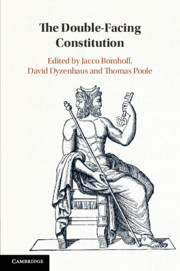Book contents
- The Double-Facing Constitution
- The Double-Facing Constitution
- Copyright page
- Contents
- Contributors
- 1 Introduction
- Part I Theoretical Foundations
- Part II Border Crossings: Comity and Mobility
- 7 The Spectre of Comity
- 8 Constitutionalism and Mobility: Expulsion and Escape among Partial Constitutional Orders
- 9 The Inside-Out Constitution
- 10 The Constitution in the Shadow of the Immigration State
- Part III The Foreign in Foreign Relations Law
- Index
9 - The Inside-Out Constitution
from Part II - Border Crossings: Comity and Mobility
Published online by Cambridge University Press: 17 January 2020
- The Double-Facing Constitution
- The Double-Facing Constitution
- Copyright page
- Contents
- Contributors
- 1 Introduction
- Part I Theoretical Foundations
- Part II Border Crossings: Comity and Mobility
- 7 The Spectre of Comity
- 8 Constitutionalism and Mobility: Expulsion and Escape among Partial Constitutional Orders
- 9 The Inside-Out Constitution
- 10 The Constitution in the Shadow of the Immigration State
- Part III The Foreign in Foreign Relations Law
- Index
Summary
Audrey Macklin engages with Canadian case law on the ‘deportability’ of non-citizen residents, as a case study on how the protection offered by constitutional rights guarantees is undermined in the field of immigration law. This project, she emphasizes, ‘is not a “whodunit” – everyone knows the culprit is sovereignty, conventionally understood’. The question to be explored, rather is how this conception of sovereignty and its exclusionary effects are ‘operationalized in a modern constitution, and at what cost’. Macklin explores this operationalization of sovereignty in the case law on the state’s right to exclude. The guiding image for Macklin’s investigation is not so much the two-faced image of Janus, but, following the sociologist Didier Bigo, the metaphor of the ‘Mobius strip’ – ‘a rectangular ribbon that has been twisted and then joined’. Whether any claim for constitutional protection raises what Macklin calls an ‘inside problem’ for a constitutional order, is a matter of perspective. Importantly, this alternative metaphor does not deny the existence of insides and outsides: ‘it does not contemplate a borderless world, but rather one where borders are relational and perspectival [&] dynamic and contingent, but no less real’.
Keywords
- Type
- Chapter
- Information
- The Double-Facing Constitution , pp. 243 - 276Publisher: Cambridge University PressPrint publication year: 2020

